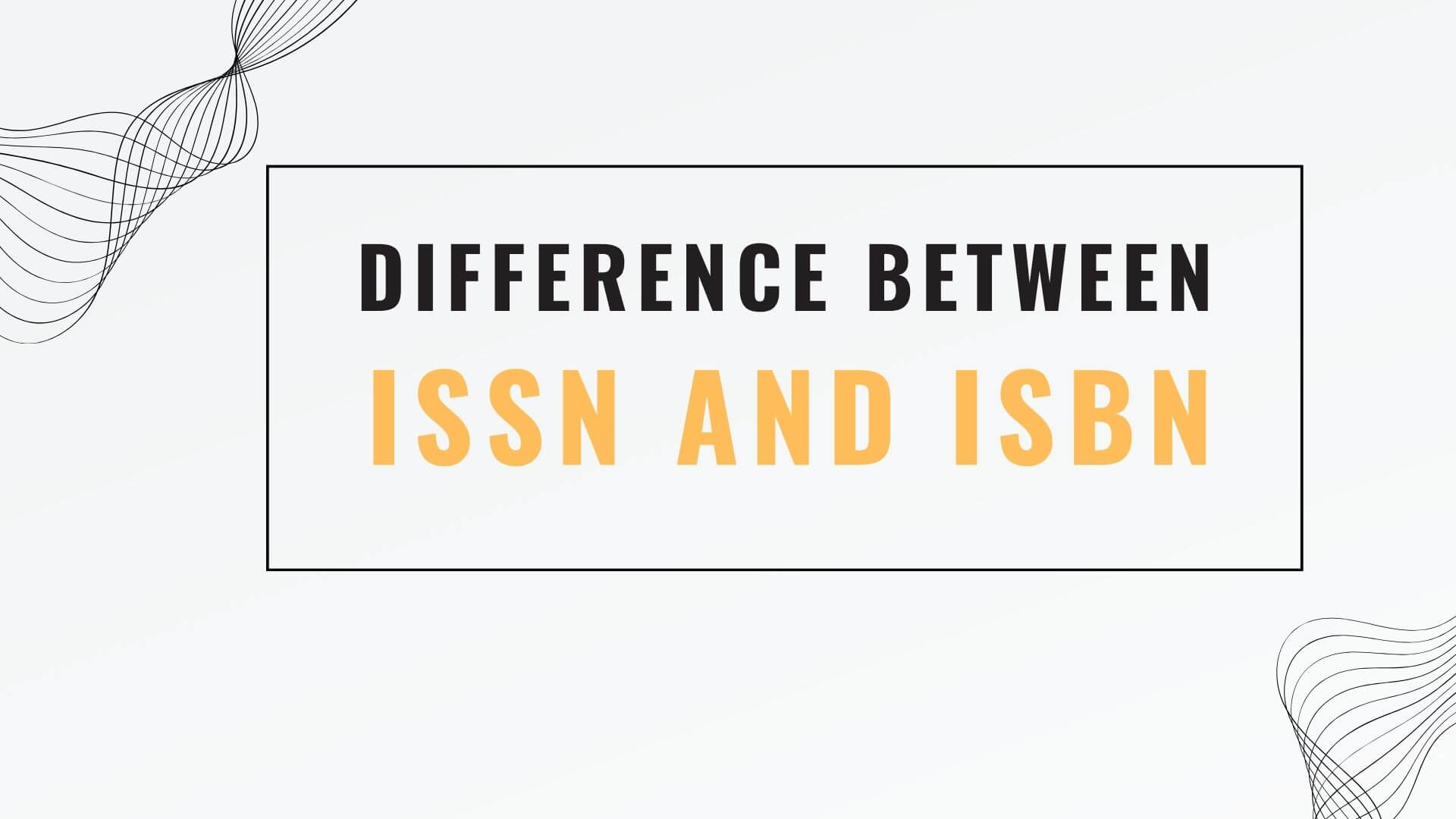What is ISSN?
ISSN stands for International Standard Serial Number. It is
a unique identifier assigned to serial publications, such as journals,
magazines, and newspapers. ISSN helps to distinguish between different
publications with similar titles and ensures the accurate identification and
retrieval of these publications. It is a standard system used internationally
for the identification and management of serial publications. ISSN is usually
an eight-digit code, divided into two groups of four digits, separated by a hyphen.
What is ISBN?
ISBN stands for International Standard Book Number. It is a
unique 13-digit number assigned to each edition and format of a published book.
This number is used to identify and track books and is required for marketing,
ordering, and inventory purposes. It allows books to be easily identified and
ensures that the correct edition or version is purchased by consumers.
Difference between
ISSN and ISBN
ISSN (International Standard Serial Number) and ISBN
(International Standard Book Number) are two different identification systems
used to uniquely identify and differentiate various publications. The main
differences between ISSN and ISBN are:
1. Purpose:
ISSN is used to identify and differentiate serial
publications, such as journals, magazines, newspapers, and annual publications.
On the other hand, ISBN is used to identify and differentiate books, including
print and digital books.
2. Format:
ISSN is an 8-digit code, while ISBN is a 13-digit code for
books published after January 1, 2007. For books published before this date,
ISBN is a 10-digit code.
3. Structure:
ISSN is structured as two groups of four digits, separated
by a hyphen. The first group represents the country code and the second group
represents the unique identification number. ISBN, on the other hand, is
structured as a series of numbers that identify the book's publisher, country,
and specific edition.
4. Issuance:
ISSN is assigned to a publication as a whole, regardless of
its format or edition. This means that different editions or formats of the
same publication will have the same ISSN. ISBN, on the other hand, is assigned
to each specific edition and format of a book. This means that a hardcover and
paperback edition of the same book will have different ISBNs.
5. Usage:
ISSN is primarily used for internal library cataloging and
record keeping, while ISBN is used for book ordering, inventory management, and
sales tracking.
6. Availability:
ISSN is available for free from the ISSN International
Centre, while ISBN must be purchased from an authorized agency in the country
where the book is published.
Overall, ISSN and ISBN serve different purposes and are used
for different types of publications. While they may seem similar, it is
important to use the correct identifier for the specific publication in order
to avoid confusion and ensure accurate record keeping.
Benefits of ISSN and
ISBN Registration
1. Credibility and
legitimacy: Registering for an ISSN (International Standard Serial Number)
or ISBN (International Standard Book Number) adds credibility and legitimacy to
your publication. These standardized codes are recognized internationally and
are commonly used by libraries, universities, and other organizations to identify
and locate publications.
2. Improved
discoverability: By obtaining an ISSN or ISBN, your publication will be
included in various databases and directories, making it easier for potential
readers to find and access your work. This can lead to increased visibility and
potential for wider distribution.
3. Protection against
plagiarism: Registering for an ISSN or ISBN can serve as a form of
copyright protection for your publication. The unique identification numbers
make it easier to track and prove ownership of your work, making it more
difficult for others to plagiarize your content.
4. International
recognition: ISSN and ISBN codes are recognized and used globally, which
can help your publication reach a wider audience. This can be particularly
beneficial for authors or publishers who are looking to expand their reach and
sell their work in different countries.
5. Increased sales
potential: Many booksellers and retailers require ISBNs for books to be
sold in their stores. Having an ISBN can help you reach a larger market and
increase your potential for book sales.
6. Professionalism:
Registering for an ISSN or ISBN can add a level of professionalism to your
publication. It shows that you have taken the necessary steps to ensure your
work is properly identified and catalogued, which can make a good impression on
readers and potential buyers.
7. Network and
community: By obtaining an ISSN or ISBN, you become part of a larger
network and community of publishers and authors. This can provide opportunities
for collaboration, networking, and support within the publishing industry.
8. Valuable
information: The ISSN and ISBN registration process requires you to provide
detailed information about your publication, such as title, author, publisher,
and subject categories. This information can be valuable for marketing and promoting
your work, as well as for understanding your target audience.
9. Long-term
identification: ISSN and ISBN codes are unique and permanent identifiers
that will remain with your publication for its entire lifespan. This can be
helpful for future editions, translations, or reprints of your work.
10. Cost-effective:
The cost of registering for an ISSN or ISBN is relatively low compared to the
potential benefits it can bring to your publication. In the long run, it can be
a valuable investment in the success and professionalism of your work.
TAGs-
Difference between ISSN and ISBN, Difference between ISSN and ISBN registration, Different between ISSN and ISBN registration

